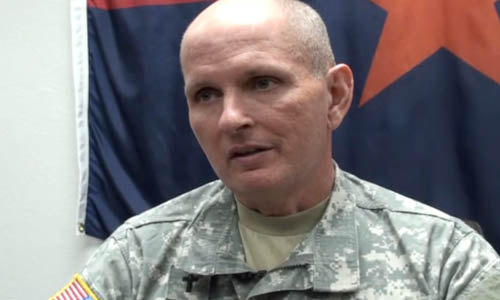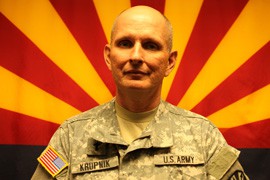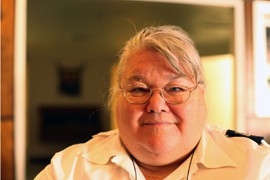Cronkite News has moved to a new home at cronkitenews.azpbs.org. Use this site to search archives from 2011 to May 2015. You can search the new site for current stories.
National Guard engaging clergy to prevent service member, veteran suicide
PHOENIX – Louise Wilson began worrying about a member of her church while volunteering with him at Phoenix Veterans Affairs Hospital. A veteran himself, the man seemed to compulsively arrange shampoo bottles they were distributing.
She knew he suffered from post–traumatic stress disorder and asked if he was still taking his medication. He told her he wasn’t.
After the man stopped volunteering and, later, stopped going to church, Wilson decided to alert VA staff members, who intervened.
“This man went to church every time the doors were open,” she said.
Military leaders in Arizona say faith–based communities often are in a better position to spot service members facing problems including stress, mental health problems and the potential for suicide.
“I see faith as a way that people can find healing in terms of maybe some of the situations and crises either as service members or as veterans from previous generations,” said Col. Elmon Krupnik, state chaplain for the Arizona National Guard.
That idea is behind a new effort that has the Arizona National Guard teaming with clergy and church members to help identify service members and veterans in crisis and build relationships that help connect them with services.
The program is modeled after Partners in Care, a military support and suicide prevention initiative started by the Maryland National Guard’s state chaplain and recognized by the National Guard Bureau as a success.
Suicide is of particular concern in Arizona because the suicide rate among the approximately 14,000 National Guard soldiers and reservists here is 10 times that of the general population nationwide, Krupnik said.
“We had a rash of several suicides over a relatively short period of time,” he said.
A national report by the Center for a New American Security said that a service member took his or her life every 36 hours between 2005 and 2010, while the rate among veterans was every 80 minutes.
The Guard, in cooperation with the Arizona Coalition for Military Families and Wounded Warrior Project, kicked off its program recently by inviting Wilson and other representatives of faith-based communities, as well as groups that work with them, to Papago Park Military Reservation.
At a seminar on suicide prevention led by representatives of the U.S. Department of Veterans Affairs, attendees learned how to connect with at–risk service members and veterans.
Other sessions introduced the group to Guard programs offering help with finances, employment and stress.
Eileen Zeller, public health adviser for the federal Substance Abuse and Mental Health Services Administration, said faith–based communities are ideal partners for the National Guard to address issues related to the stress of military life.
“Congregations are natural helpers,” she said. “It’s where people go for support and comfort.”
But the Rev. Jeff Gallen, a retired Air Force chaplain and a family and marriage therapist who attended the summit, said training and partnerships are only part of the solution. He suggested providing federal money to the groups.
“I’m not sure that church agencies are going to have the funds to pick up the slack that the federal government expects us to,” he said.
The Arizona faith–based summit was the first of five around the country organized in collaboration with the National Guard Bureau, the National Action Alliance for Suicide Prevention’s Military/Veterans Task Force and the Substance Abuse and Mental Health Services Administration. Other summits were scheduled in Minnesota, Missouri, Oregon and Virginia.
Krupnik said establishing a connection between service members and those that can provide support is just the first step. The National Guard also is identifying ways to help Arizonans better understand the military and service members.
In March, for example, the Guard is offering an immersion experience allowing citizens to live the life of a soldier.
“I think that if there’s anything that changes in terms of suicide prevention, it is going to be at the local community level because that’s where you make contact with people,” Krupnik said.










